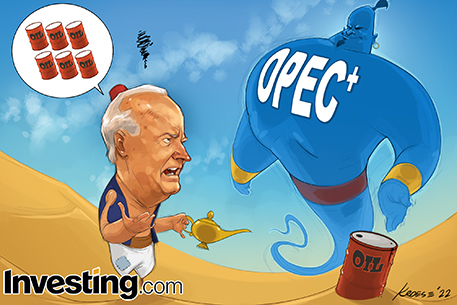By Geoffrey Smith
Investing.com -- It’s safe to say U.S. President Joe Biden had something grander in mind when he went to Saudi Arabia last month to ask Saudi Arabia for an increase in crude oil output.
The 100,000 barrel-a-day increase from September agreed by OPEC and its partners last week – even if fully delivered (which it won’t be) – would only represent a 0.1% increase in world oil supply, nowhere enough to tip the scales on the world market.
Gone, it seems, are the days when the visit of a U.S. President, with all that that implies in terms of a stamp of approval from the world’s leading superpower, would elicit the policy response that Washington wanted. In fairness, though, the writing has been on the wall long enough – at least since North Korea’s Kim Jong-Un served up a similar nothingburger to Donald Trump in 2018.
The state of U.S. political discourse is such that both sides of the partisan divide see the failure of such visits as proof of their claim that the country has gone to the dogs under the leadership of their opponents. Throwing mud at one’s opponents is easier than explaining that the U.S. can't dictate world energy prices, or explaining the contribution of the U.S.'s own policy to the current situation.
Over the last two decades, the U.S. has – for foreign policy reasons that don’t need to bother us here – deliberately crippled the oil industries of Venezuela and Iran. Under sanctions, those countries’ output has fallen by some 3.4 million barrels a day.
The invasion of Iraq and civil war in Libya had hardly helped global supply either, although the former’s recovery as an oil exporter – under conditions that are still far from stable – has been impressive.
The U.S. and its European allies are now trying the same tactic on Russia, the world's second-largest exporter after Saudi Arabia. It hasn’t worked yet, but that’s not to say it won’t have a similar effect in the medium term. After an initial drop, Russia’s oil output is now close to where it was before the invasion of Ukraine, Energy Minister Alexander Novak said last week. However, given its dependence on foreign expertise and equipment to sustain that, a medium-term decline looks likely. Artificial restrictions to global supply look baked in for some time.
In a world where secular demand is still rising, and will continue to rise for some years yet, the effects of these political actions on world prices can be contained as long as the U.S. and allies such as Canada are themselves raising production in adequate measure.
That is not likely to be the case for another few months, at least. A feature of this quarter’s earnings season – alongside windfall profits for anyone selling oil and oil products - has been service providers such as Halliburton (NYSE:HAL) and Schlumberger (NYSE:SLB) saying that they haven’t got the people or gear to allow a faster rise in output. U.S. output is over a million barrels a day below its 2019 peak.
This is not all the fault of the Green lobby. The pandemic exposed the fact that much of the shale boom had been financed by reckless borrowing, leaving the industry unable to absorb even a modest downturn, let alone the hurricane that hit it in 2020. Wall Street was asking for its money back long before the current administration and majority on Capitol Hill got their hands on the levers of U.S. energy policy.
Then there is the small matter of the endless corruption and inefficiency in other OPEC members lucky (or unlucky?) enough to have been blessed with large oil reserves. OPEC member Nigeria has seen its output halve in the last 15 years, despite an abundance of resources, as chronic vandalism and theft, along with the kidnapping and extortion of its employees, has persuaded international oil majors such as Shell (LON:RDSa) and Exxon Mobil (NYSE:XOM) that their money would be better invested elsewhere. Exxon appeared to wrap up the sale of its last Nigerian assets earlier this week - only to hit a fresh regulatory hurdle the next day.
Ogbonnaya Orji, head of the Nigerian Extractive Industries Transparency Initiative (NEITI), told a conference earlier this year that Nigeria lost 260 million barrels of crude to theft in the last five years, an average of over 140,000 barrels a day.
This is not to excuse Shell’s lamentable record in the Niger Delta over the years, which reached its low point in the 1990s with its collusion in the Abacha regime’s judicial murder of activist Ken Saro-Wiwa.
But for all its failings, the world urgently needs to stop demonizing the oil and gas industry - both public and private - and allow it the space to invest and, yes, earn a return on that investment. Without it, supply shortages will become more acute and energy – the essential ingredient of modern economic life - will become increasingly a luxury.
